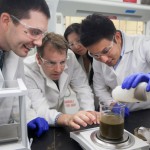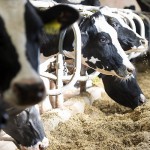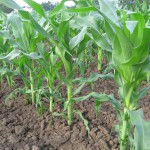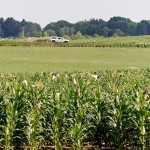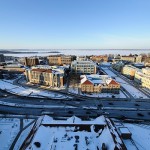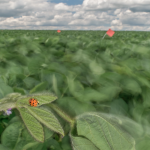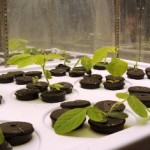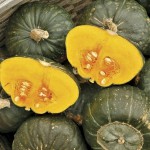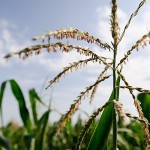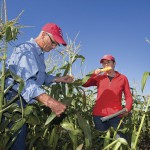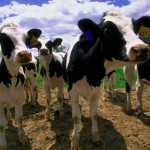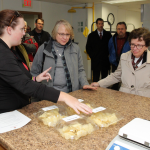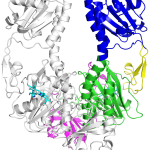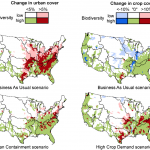Tag Agriculture
Helping Wisconsin dairy farms produce ‘brown gold’
In the heart of Wisconsin, a project is underway to produce energy from a resource in little danger of running low: cow manure, also known as "brown gold."
UW experts forecasting 2015 Wisconsin agriculture trends
In 2014, the total net farm income in Wisconsin reached an all-time high of more than $4 billion, but agricultural experts at the University of Wisconsin–Madison are predicting some changes in 2015. Bruce Jones, a professor of agricultural and applied economics at the University of Wisconsin–Madison, will be among a handful of UW–Madison and UW-Extension experts to recap the status of Wisconsin’s agricultural enterprise in 2014 and discuss trends developing for 2015 at the Wisconsin Agricultural Economic Outlook Forum on Wednesday, Jan. 21.
Collaboration yields new organic sweet corn variety
When the time comes for Wisconsin’s organic farmers to decide which crops to plant next year, they’ll have a tasty new variety of sweet corn — with a particularly sweet name — among their choices. The new variety, called “Who Gets Kissed?,” is the first in a series of organic, open-pollinated sweet corns being developed through a plant-breeding project led by researchers at the University of Wisconsin–Madison and the Organic Seed Alliance (OSA). Farmers and professional breeders are also involved.
Crops play a major role in the annual CO2 cycle increase
In a study published Wednesday, Nov. 19, in Nature, scientists at Boston University, the University of New Hampshire, the University of Michigan, the University of Minnesota, the University of Wisconsin–Madison and McGill University show that a steep rise in the productivity of crops grown for food accounts for as much as 25 percent of the increase in this carbon dioxide (CO2) seasonality.
When the isthmus is an island: Madison’s hottest, and coldest, spots
In a new study published this month in the Journal of Applied Meteorology and Climatology, University of Wisconsin–Madison researchers highlight the urban heat island effect in Madison: The city’s concentrated asphalt, brick and concrete lead to higher temperatures than its nonurban surroundings.
Dwindling wind may tip predator-prey balance
Bent and tossed by the wind, a field of soybean plants presents a challenge for an Asian lady beetle on the hunt for aphids. But what if the air - and the soybeans - were still?
A touching story: The ancient conversation between plants, fungi and bacteria
The mechanical force that a single fungal cell or bacterial colony exerts on a plant cell may seem vanishingly small, but it plays a heavy role in setting up some of the most fundamental symbiotic relationships in biology. In fact, it may not be too much of a stretch to say that plants may have never moved onto land without the ability to respond to the touch of beneficial fungi, according to a new study led by Jean-Michel Ané, a professor of agronomy at the University of Wisconsin–Madison.
UW field days will focus on the flavor of organic vegetables
University of Wisconsin–Madison plant scientists intend to employ some highly sophisticated instruments to evaluate new varieties of organic vegetables: the palates of the people who produce or prepare them for discerning customers.
Winning teams address global food system challenges, from food spoilage to hunger
The national Agricultural Innovation Prize: Powered by 40 Chances announced winning student teams during a two-day competition held at the University of Wisconsin–Madison on April 25-26, where students, competition judges, experts from a range of backgrounds and the public explored finalists' projects and larger ideas in business, science and society.
Breakfast on the Farm set for April 27
The Association of Women in Agriculture (AWA) is hosting its Breakfast on the Farm on Sunday, April 27 in the Stock Pavilion at 1675 Linden Drive.
Perennial energy crops could provide environmental benefits
Rows of corn and soybeans cover rolling hills, stitched together by creeks and woodlands that compose southwest Wisconsin's agricultural patchwork. These complex landscapes provide clean water, wildlife habitat and climate benefits, yet, historically their value has been measured in just one way: bushels per acre.
Water systems research fills in the details for Africa’s largest dam
When the government of Ethiopia finishes building the Grand Ethiopian Renaissance Dam (GERD) in 2017 or 2018, it will not only have built the largest hydroelectric power-generation plant in Africa, but also stirred up tensions among African nations, and indelibly altered a river that itself has guided millennia of human history in the region.
New technology could help food crops thrive in crowded fields
With the global population expected to reach 9 billion by 2050, the world's farmers are going to need to produce a lot more food - but without using much more farmland, as the vast majority of the world's arable land is already being used for agriculture.
Study puts freshwater biodiversity on the map
When it comes to economic growth and environmental impacts, it can seem like Newton's third law of motion is the rule - for every action, there is an equal and opposite reaction - and that in most cases, the economy prospers and the environment suffers.

